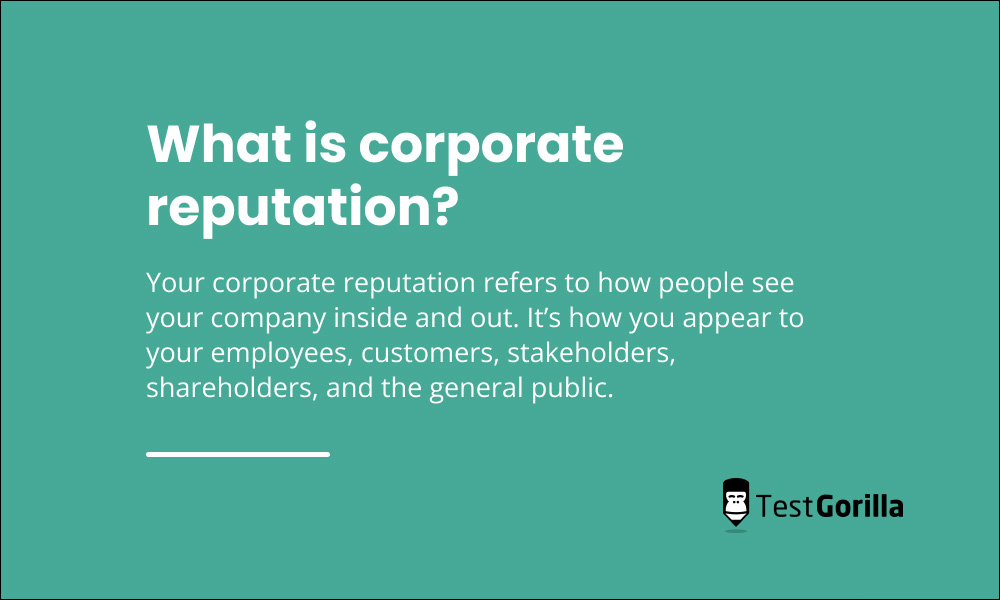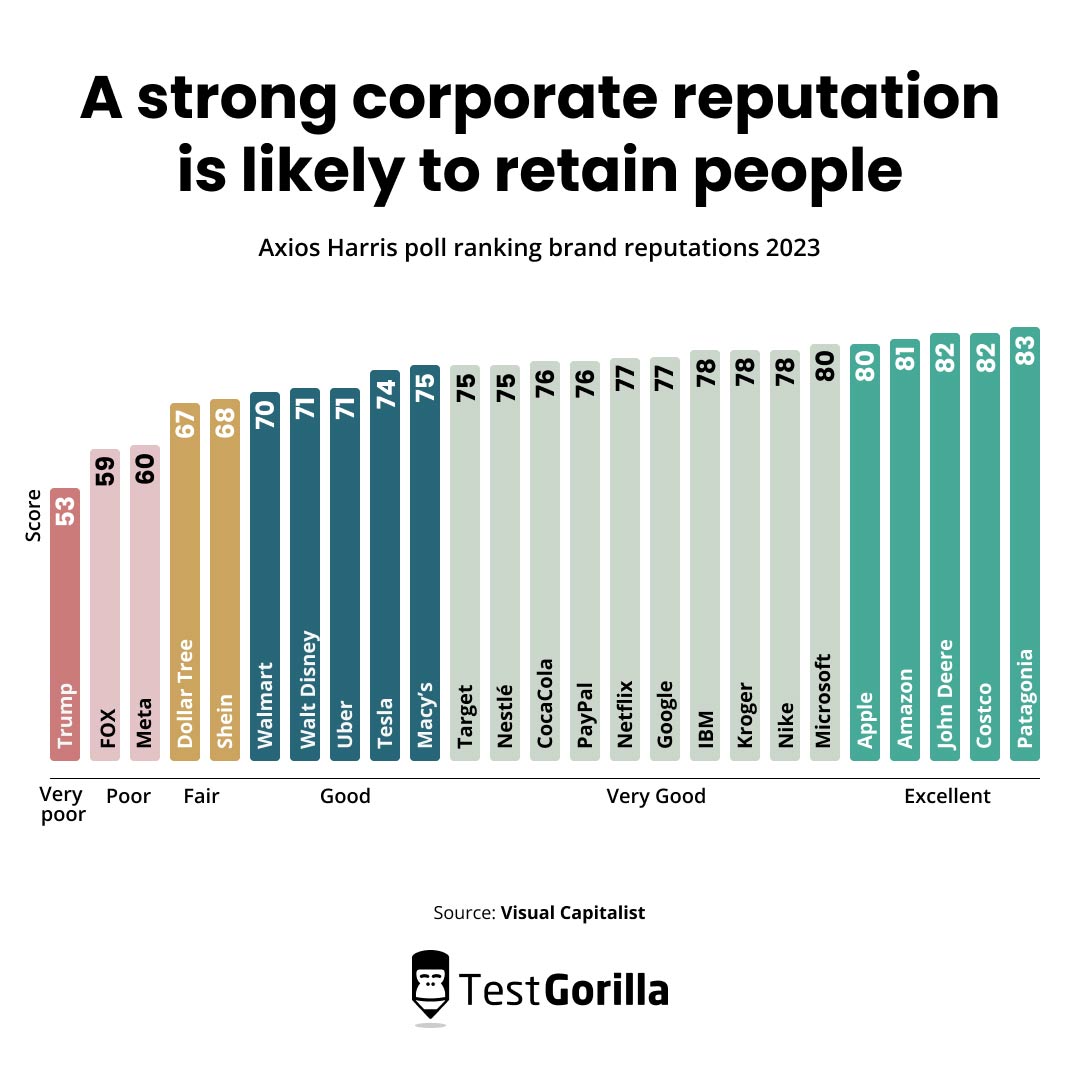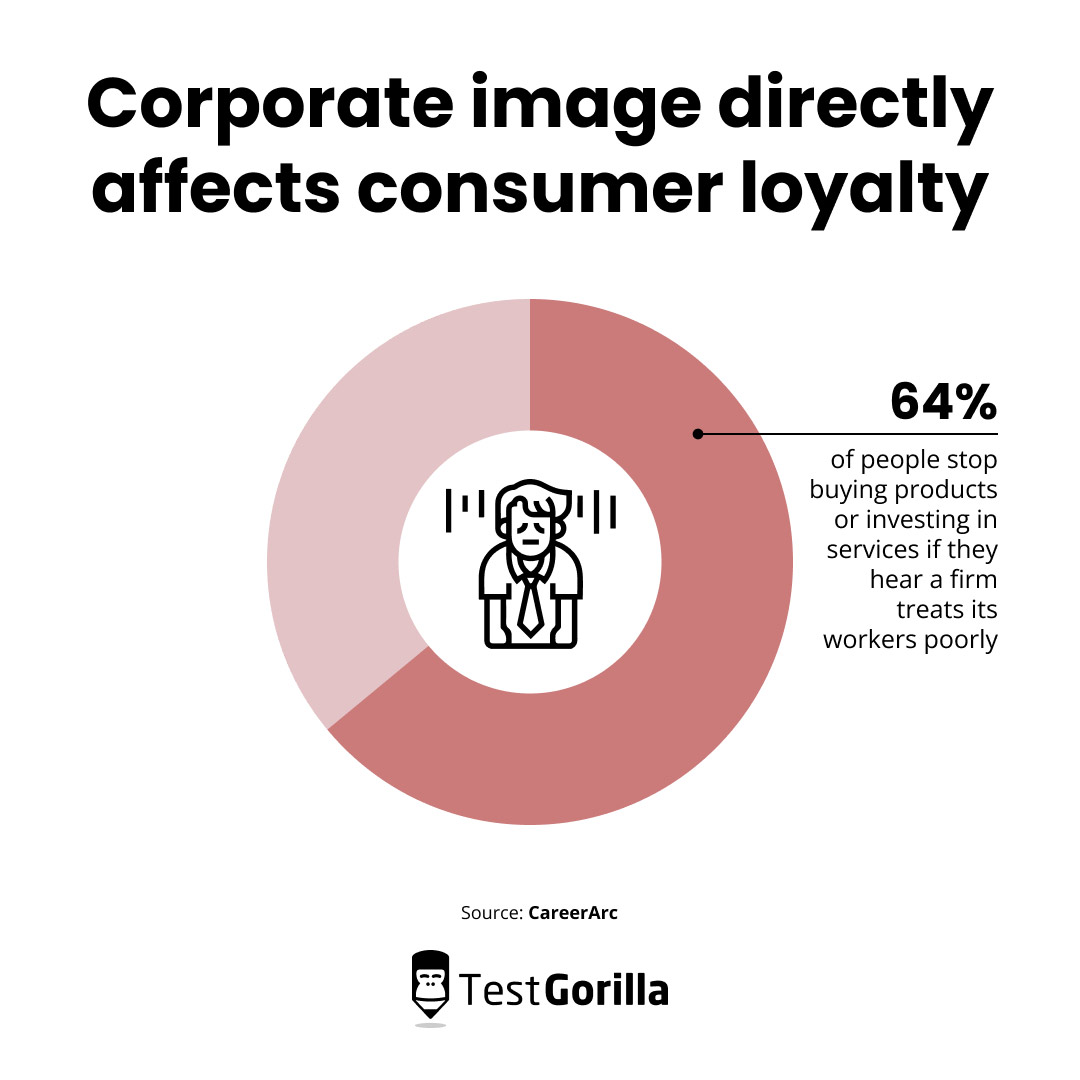A positive corporate reputation shows you're reliable, supportive, and quality-focused.
A negative reputation, however, waves away customers and employees.
The statistics speak for themselves. Companies with strong reputations are 20 times more likely to retain employees.[1]
Moreover, workers are 10 times more likely to leave due to a toxic culture than poor employee compensation.[2]
Failure to address your reputation increases your employee turnover rate – and your bad rep is soon a talent repellent.
Instead, if you focus on building a solid reputation and employee experience, you can retain genuinely skilled and communicative people who know you’re good for your promises.
In this guide, we take you through the key benefits of a positive reputation and why it's a talent retention trend you can rely on.
Table of contents
- What is corporate reputation?
- Why is your corporate image important?
- The benefits of corporate reputation management
- 7 best practices for leveraging your corporate reputation to retain your best performers
- Corporate image: 3 examples of companies succeeding with this talent retention trend
- Build a corporate reputation your employees can be proud of
What is corporate reputation?
Your corporate reputation refers to how people see your company inside and out. It’s how you appear to your employees, customers, stakeholders, shareholders, and the general public.
It’s the same as your corporate image, the mental picture people create whenever they think of your brand.
What is corporate reputation management?
Corporate reputation management concerns how you handle the different factors that can change how people view your organization.
Controllable elements of corporate reputation and brand image include your:
Customer service standards
Communication with stakeholders and shareholders
Business ethics and values
Employee standards and support network
Work environment
Product and service quality
Media coverage
Value in the marketplace
A firm with a strong, positive corporate reputation is likelier than most to foster trust from buyers, staff, and investors.
Meanwhile, a weak or negative reputation lessens trust, potentially leading to financial loss and staffing reduction.
What’s the difference between corporate reputation and corporate identity?
Your corporate identity is the image you present to the public. Your reputation establishes how trustworthy you are as part of that identity.
Your identity covers further aspects of your public perception, such as your visual identity and how you communicate.
Why is your corporate image important?
A strong reputation suggests your business is credible and, therefore, likely to protect the interests of your employees, clients, and stakeholders.
Let's consider the importance of corporate reputation for investors as a quick example. A strong reputation suggests their money is safe with you during economic uncertainty. For you, that means an increased chance of financial investment over time.
And companies with solid reputations have a competitive edge in retaining talent and creating appealing products.
That said, exceptional reputations are surprisingly uncommon. Axios and Harris say few household brands hold “excellent” reputations.
Here’s a visualization of how company reputations rank according to their poll:
Meanwhile, those who work for employers with strong reputations feel prouder of what they do and feel like they make a difference.
Research shows 92% of people would leave a job if they could work elsewhere for a brand with an excellent reputation.[3]
Therefore, a strong corporate reputation is likely to retain people who genuinely care about their work. A poor reputation risks hiring people who stay purely for the money and are prone to quick quitting.
The best insights on HR and recruitment, delivered to your inbox.
Biweekly updates. No spam. Unsubscribe any time.
The benefits of corporate reputation management
Some of the tangible benefits of a solid corporate image include:
Increased employee retention
Higher customer loyalty
More market competitiveness
Better business performance
Improved talent acquisition
Let’s break these down.
Increased employee retention
Employees stay longer with companies with strong reputations, particularly those renowned for providing various employee benefits and learning and development opportunities.
Positive reputation factors that increase retention include:
Remote working policies
Career growth opportunities
Wellbeing benefits
Professional development plans
An engaging onboarding process
Corporate reputations are rooted in trust. For millennials, they are up to 22 times more likely to stay if there is a strong culture of trust.[4]
It’s why many businesses prioritize establishing and promoting a good company culture when recruiting.
A strong, positive culture helps retain the trust recruits place in you when they join, thus reducing employee attrition rates.
Data shows us that retention rates are skyrocketing for firms with high trust scores. For example, Chick-fil-A – a business that scores as an “excellent" company on the Axios and Harris poll – has an average employee retention term of 3.1 years.
That rate is considerably higher than the average tenure for food service employees in the US, which measures 1.7 years.[5]
People want to work with companies that promise and uphold positive values important to them, too. Around 70% of workers are likely to recommend working for their employer when their values align, and their likelihood of leaving drops to 33%.[6]
Higher customer loyalty
Corporate image directly affects consumer loyalty. For instance, 64% of people stop buying products or investing in services if they hear a firm treats its workers poorly.[7]
Millennial and Gen Z workers, in particular, prioritize purchasing from brands that align with their values. Research claims up to 83% of people aged 18 to 34 see this as an important purchasing driver.
What's more, up to 62% of people stay loyal to a brand purely because they trust their reputation. Up to 67% from the same survey pool claim they buy products based on good corporate reputation but stop buying them if they can't build trust with brands.[8]
Therefore, companies need to focus on:
Providing excellent customer service
Producing high-quality products
Treating workers fairly
Following through on commitments and values
More market competitiveness
In packed marketplaces, strong reputations often outpace marketing pizzazz when it comes to having a competitive advantage.
Ultimately, customers are more likely to shop with a reliable brand in a few key areas. For example, almost 80% value convenience, speed of service, and friendly support when choosing and sticking with a company.[9]
Firms that build positive reputations on these tenets have greater market value and profitability than most and are likely to break ahead of the pack.
A well-reputed business can also protect itself against organizations that offer similar services at a cheaper rate because of its brand promise.
Better financial performance
With increased customer loyalty comes positive recommendations, further increasing buyer numbers – and immediately improving your bottom line.
In some cases, poor corporate reputations lead to media negativity and even service and product boycotts, thus leading to a financial downturn. Customers always vote with their money.
Consider John Deere, the farming equipment firm. The brand came third in Axios and Harris's poll and has continued to build global revenue in large part thanks to its solid reputation.
Corporate reputation affects stock prices, too. Research claims corporate reputations account for around 35.3% of the market capital of the top 15 equity market indices – shareholder value that reaches nearly $17tn worldwide.[10]
Company reputation can devalue stocks dramatically if there are dips in management quality, perceived long-term reliability, or financial strength.
Improved talent acquisition
A company with a good corporate reputation and appealing employer branding attracts candidates who are genuinely enthusiastic about working in that specific industry. They're looking for a reliable firm to develop with, not a short-lived money grab.
Talented workers trust positive word-of-mouth from others in their professional networks. They look for companies offering competitive learning opportunities and internal mobility – and who prove to value their skills and initiative.
7 best practices for leveraging your corporate reputation to retain your best performers
Building a solid corporate image is a long-term project, so be sure to follow these seven steps to follow through on your corporate reputation management efforts.
7 methods for building a reliable corporate image: A summary
Best practice | In brief |
1. Foster a skills-based environment | Assess and develop employees using skills tests to show you value their talents, not only their experience |
2. Audit your online presence | Monitor mentions of your brand online with Google Alerts and check review sites to measure how people presently view your firm |
3. Build a team to handle your corporate reputation | Hire experts with skills tests to track real-time reputation data, manage public relations, create content, and monitor reviews |
4. Clearly define and stand by your values | Work with all levels of your business to decide upon values that speak to you, your people, and your buyers – and stick to them to foster trust |
5. Prioritize employee engagement and wellbeing | Show people you care about more than the targets they hit by promoting wellbeing initiatives and tailoring benefits to improve morale |
6. Be transparent and communicate clearly | Break down barriers between workers and managers and provide support and guidance out in the open, building trust |
7. Create an inspiring corporate social responsibility (CSR) strategy | Track your broader impact on the environment, the economy, and the people you work with to strengthen your reputation and show you care about your values and impact |
1. Foster a skills-based environment
Much of your corporate reputation with employees revolves around the strength of your culture.
By leaning into skills instead of experience, you make your workplace more positive and productive.
For instance, research shows that skills-based companies are 98% more likely to build positive reputations for fostering individual career growth.[11]
The same research claims that skills-focused businesses are 47% more likely to foster an inclusive culture, thus retaining staff who might otherwise feel marginalized at less progressive workplaces.
Start by sewing skills testing into your hiring process and ditch the resume checks. In your marketing and branding, make it clear you match people to roles based on their skills rather than education and experience.
You could create a custom assessment plan based on core role competencies, personalities, and power skills, and share these details in your recruitment marketing before you hire.
For example, here's a marketing specialist assessment you could create through TestGorilla and share with potential recruits:
Then follow through on promises by providing one-on-one meetings to help recruits develop skills and to find opportunities for them across your organization.
Skilled workers stay with your business for longer, and positive word spreads that you value people for their talent rather than their arbitrary experience.
This strategy retains workers who want to develop with a supportive company that believes in the power of its people.
2. Audit your online presence
Always monitor what people say about you online. Up to 98% of people use the internet to find information about local businesses, and 46% trust online reviews as much as they trust brand opinions from friends and family.[12]
A full audit of your online presence gives you a detailed picture of how people perceive you through social media, review channels, news outlets, and directories.
Ideally, watch for:
Mentions of your brand online
Customer reviews
Employee reviews
Social media tags and interactions
A good start to any digital audit is to set up Google Alerts. Through this free tool, you ask Google to report back via email on any mentions of your business.
Then, regularly monitor hashtags on social media related to your organization and products, and research niche review sites where users can rate your services and reputation. Consider using the following:
Glassdoor, where employees leave reviews
Yelp, where customers review businesses out of five stars
Google Reviews, where customer ratings affect your SEO
You could start improving or adjusting your marketing, product development, and workplace culture strategies by monitoring online mentions.
3. Build a team to handle your corporate reputation
In line with the above, consider hiring a corporate reputation management team to:
Create strategies to help improve your public image
Track what people say about you
Handle reputation crises
Research the beliefs that employees, customers, stakeholders, shareholders, and the general public hold about your company
For example, you could hire a team that handles:
Data collection and metrics analysis
Review management and responses
Social media posts and public relations
Search engine optimization (SEO)
Content creation and marketing
Information removal, if and where appropriate
Hiring a team to cover these bases requires finding people with a series of hard and soft skills (also known as power skills). It pays to test candidates for these traits when recruiting rather than relying on reported experience.
Use talent assessment software to verify candidates have the right skills and competencies for your corporate reputation team. You can test recruits on platform-specific brand management skills, such as TikTok marketing, and general skills, like critical thinking.
If you’re unsure which skills are necessary for a role, TestGorilla recommends assessments for the core job duties. For example, if you’re hiring an SEO consultant to improve your reputation on search engine result pages, here’s what we suggest:
With the right team of skilled professionals, you can develop a reputable image online – and catch any reputation issues early on.
4. Clearly define and stand by your values
Research states that up to 88% of job applicants see company cultures as somewhat important when looking for the right business to join and stay with.[13]
However, only 26% of US workers believe their employers follow through with the values and cultural standards they promote.[14]
If you don’t clearly define and follow through on the values you promote, you don’t only disappoint people who want to leave your firm, but news spreads fast that you’re unreliable for keeping your word.
Avoid this by clearly identifying the values running core to your brand. You could start by:
Researching brands in your industry that inspire you
Asking board members, employees, and stakeholders their opinions
Decide why it’s important to uphold certain values
Consider ways to uphold these values in practice
Get management and employee feedback
Then, live out these values. Consider how your culture affects your processes, working standards, and product quality. Show your employees that "values" are more than flat buzzwords you use to attract people and then forget about.
You could then use our Culture Add test in future recruitment drives, for example, to ensure your recruits share the same values and vision and want to stay with you for longer.
5. Prioritize employee engagement and wellbeing
Showing you genuinely care about employee wellbeing inspires workers to stick with you.
Employees working for companies that care about their wellbeing are up to 69% less likely to look for other jobs. Moreover, they're much less likely to report burnout and are three times as engaged as the average staff member.[15]
Plus, people with specific employment needs are likely to stay on board. For instance, benefits like flexible work policies improve your long-term suitability with employees looking for remote work and more than double the chances of them recommending your company.[16]
Across the board, consider introducing policies and benefits that support a better work-life balance and boost happiness at work.
Consider offering employee benefits such as:
Wellness stipends and vouchers
On-site classes and gym access
Flexible schedules
Work-from-home policies
Family support
Travel stipends
Team events
6. Be transparent and communicate clearly
People inside and outside your organization value transparency. Research shows that 94% of customers are likely to be loyal to a business that's transparent and detailed in its marketing and corporate communications.[17]
The same applies to employees: Slack demonstrated that 80% of workers desire more insight into corporate decision-making, and 87% want to work somewhere transparent.[18]
Transparency fosters trust, which improves your reputation. You could take steps to improve transparency in the workplace by:
Mapping out the chain of command
Taking time to support with employee coaching
Giving employees access to in-person time with managers and leaders
Providing information and not hiding details away
Asking for insight and feedback into your processes
Ensuring clearer leadership communication
A transparent reputation travels far by word of mouth, particularly if you fortify it by following through on your hiring promises. You retain people for longer and improve your standing in the minds of those who want to work with you.
7. Create an inspiring corporate social responsibility (CSR) strategy
As established, most of us highly value culture and values when deciding which companies to work with. Glassdoor claims that 79% of employees and recruits consider a company’s purpose and mission important when choosing an employer to stay with.[19]
Creating a strong, ethical corporate social responsibility strategy, or CSR strategy, pays. A CSR plan helps you create and monitor your firm's impacts across several areas of social responsibility.
For instance, consider your environmental impact, your charitable donations, and how fairly you treat your employees and those on the supply chain.
Tracking and reporting on your social initiatives effectively proves that you're committed to ethical causes.
Transparency on spending and initiative results add further weight to your reliability in the eyes of the public and in those of employees who want to feel proud of who they're working for.
Start by considering ways to cut carbon emissions effectively, creating initiatives to support employees better, and auditing where you buy supplies. For instance, are you sure you're buying materials from ethical sources?
Corporate image: 3 examples of companies succeeding with this talent retention trend
Let's close by examining three recognizable brands boosting employee retention rates by the strength of their corporate reputations.
Inspiring corporate reputation examples
Company | Why it’s inspiring |
Rolex | Popular with buyers and employers for its transparent and honest messaging, along with high-quality products |
Microsoft | Well-known for its cultural importance and approachability alongside strong CSR commitments |
Costco | Highly praised for its meticulous partnership-building, affordable product lines, and exclusive membership standards |
Rolex
Rolex, the Swiss watchmaking giant, has topped global brand reputation indexes several years in a row.[20]
Its solid reputation in the eyes of the public, employees, and shareholders stems from its commitment to ethical sourcing and premium product value.
Regardless of its premium price tag, the company’s reputation for transparency, honesty, and exceptional engineering ensures it’s become a proper noun in its own right – “Are you wearing a Rolex?”
The firm benefits from strong employee culture, leadership, and outlook scores. According to Comparably, it's firmly in the top 25% of companies of its size for retaining top talent.[21]
Microsoft
Like other software companies, Microsoft has weathered storms with product issues across the years, but it remains a global brand that millions trust for productivity and entertainment.
It's gained plaudits for its CSR commitments through reducing carbon emissions and donating money to global nonprofits.[22]
The brand gained additional praise for building upon its reputation through a commitment to product quality, trustworthy leadership, and general governance.
Moreover, it's recognized for its cultural transformation as a supportive brand in what many see as a cutthroat industry.[23]
These reputation boosters have helped to boost retention at the organization, with employees staying at the firm for an average of 5.2 years.[24]
Costco
Costco, the wholesale big-box retail company, ranks highly in the Axios and Harris polling, rising in popularity over the past few years.
Many see the firm as a stable and comfortable presence in the US, and its focus on affordable, quality goods is key to its popularity.[25]
The brand sources products from suppliers that have strong reputations of their own. Moreover, in addition to its stringent quality control, the service runs an exclusive members-only platform, which helps to create a community of shoppers.[26]
Employees find the brand appealing, too, because workers at the firm stay for 4.6 years on average.[27]
Build a corporate reputation your employees can be proud of
If your employee retention is on the downturn despite innovative products and impressive marketing, your corporate reputation could be to blame.
Thankfully, there are several ways to boost your corporate image for staff, shareholders, and customers. It all starts with:
Following through on your promises
Showing staff you care about their morale and wellbeing
Delivering top-quality products and services
Grading people on skills, not experience
Being transparent with everyone you communicate with
If you’ve found this guide to managing corporate reputation helpful, we recommend you dive into further reading via our guide to improving employee recognition. It's a key factor in building a solid reputation.
From there, learn more about how to measure and mitigate employee flight risk for the future.
When you're ready to start making your hiring process more inclusive and inspiring, head to the TestGorilla library and build free skill assessments.
Sources
1. “Corporate Reputation as a Key Driver of Employee Retention”. (August 14, 2019). LIGS University. Retrieved November 21, 2023. https://ligsuniversity.com/blog/corporate-reputation-as-a-key-driver-of-employee-retention
2. Sull, Donald; Sull, Charles; Zweig, Ben. (January 11, 2022). “Toxic Culture Is Driving the Great Resignation”. MIT Sloan Management Review. Retrieved November 21, 2023. https://sloanreview.mit.edu/article/toxic-culture-is-driving-the-great-resignation/
3. “Annual Corporate Responsibility Magazine survey reveals: Females far less likely to join a company with a bad reputation”. (October 16, 2015). PR Newswire. Retrieved November 21, 2023. https://www.prnewswire.com/news-releases/annual-corporate-responsibility-magazine-survey-reveals-females-far-less-likely-to-join-a-company-with-a-bad-reputation-300161114.html
4. “2018 Best Workplaces for Millennials Summary”. (2018). Great Place To Work. Retrieved November 21, 2023. https://www.greatplacetowork.com/resources/reports/2018-best-workplaces-for-millennials-summary
5. “Employee Tenure in 2022”. (September 22, 2022). Bureau of Labor Statistics: US Department of Labor. Retrieved November 21, 2023. https://www.bls.gov/news.release/pdf/tenure.pdf
6. “Employees who feel aligned with company values are more likely to stay”. (April 25, 2022). Qualtrics. Retrieved November 21, 2023. https://www.qualtrics.com/blog/company-values-employee-retention/
7. “CareerArc Employer Branding Study”. CareerArc. Retrieved November 21, 2023. https://www.careerarc.com/lp/employer-branding-study/
8. “2019 Edelman Trust Barometer Special Report: In Brands We Trust?”. (2019). Edelman. Retrieved November 21, 2023. https://www.edelman.com/sites/g/files/aatuss191/files/2019-07/2019_edelman_trust_barometer_special_report_in_brands_we_trust.pdf
9. “Experience is everything: Here’s how to get it right”. (2018.) PwC. Retrieved November 21, 2023. https://www.pwc.com/us/en/advisory-services/publications/consumer-intelligence-series/pwc-consumer-intelligence-series-customer-experience.pdf
10. “What price reputation?”. AMO. Retrieved November 21, 2023. https://www.australasianir.com.au/common/Uploaded%20files/AIRA%20Documents/Member%20Update%20Documents/AMO_What_Price_Reputation_report_R2[2]%20(1).pdf
11. “The skills-based organization: A new operating model for work and the workforce”. (2022). Deloitte Insights. Retrieved November 21, 2023. https://www2.deloitte.com/content/dam/insights/articles/us175310_consulting-the-skills-based-org-report/DI_The-skills-based-organization-report.pdf
12. Paget, Sammy. (February 7, 2023). “Local Consumer Review Survey 2023”. BrightLocal. Retrieved November 21, 2023. https://www.brightlocal.com/research/local-consumer-review-survey/
13. “2018 Job Seeker Nation Study”. (2018). Jobvite. Retrieved November 21, 2023. https://www.jobvite.com/wp-content/uploads/2018/04/2018_Job_Seeker_Nation_Study.pdf
14. Efron, Louis. (December 14, 2022). “Are Your Company Values More Than Just Words?”. Gallup Workplace. Retrieved November 21, 2023. https://www.gallup.com/workplace/406418/company-values-words.aspx
15. “What Is Employee Wellbeing? And Why Does It Matter?”. Gallup Workplace. Retrieved November 21, 2023. https://www.gallup.com/workplace/404105/importance-of-employee-wellbeing.aspx
16. “2022 Global Talent Trends: The Reinvention of Company Culture”. (2022). LinkedIn Talent Solutions. Retrieved November 21, 2023. https://business.linkedin.com/content/dam/me/business/en-us/talent-solutions-lodestone/body/pdf/global_talent_trends_2022.pdf
17. “STUDY: Nearly Three-Fourths of Consumers Would Pay More for Products that Offer Complete Transparency”. (August 30, 2016). PR Newswire. Retrieved November 21, 2023. https://www.prnewswire.com/news-releases/study-nearly-three-fourths-of-consumers-would-pay-more-for-products-that-offer-complete-transparency-300318901.html
18. “Trust, tools and teamwork: what workers want”. (October 3, 2018). Slack. Retrieved November 21, 2023. https://slack.com/intl/en-gb/blog/transformation/trust-tools-and-teamwork-what-workers-want
19. ”New Survey: Company Mission & Culture Matter More Than Compensation”. (July 10, 2019). Glassdoor for Employers. Retrieved November 21, 2023. https://www.glassdoor.com/employers/blog/mission-culture-survey/
20. “Rolex ‘most reputable global brand’ for third straight year”. (March 16, 2018). Swissinfo.ch. Retrieved November 21, 2023. https://www.swissinfo.ch/eng/business/reputation-institute_rolex--most-reputable-global-brand--for-third-straight-year/43978096
21. “Comparably: Rolex”. Comparably. Retrieved November 21, 2023. https://www.comparably.com/companies/rolex/retention
22. O’Reilly, Lara. (October 1, 2013). “Microsoft has best global CSR reputation”. Marketing Week. Retrieved November 21, 2023. https://www.marketingweek.com/microsoft-has-best-global-csr-reputation/
23. Bort, Julie. (November 19, 2019). “Microsoft's reputation is soaring as trust in the tech industry flounders, according to new research”. Business Insider. Retrieved November 21, 2023. https://www.businessinsider.com/microsoft-reputation-institute-soaring-research-2019-11
24. “Microsoft Demographics and Statistics”. Zippia. Retrieved November 21, 2023. https://www.zippia.com/microsoft-careers-7480/demographics/
25. Santos, Melissa. (June 1, 2023). "Costco ranked second-most trusted US company". Axios. Retrieved November 21, 2023. https://www.axios.com/local/seattle/2023/06/01/costco-reputation-poll
26. “Costco’s Reputation through the Years: A Legacy of Excellence and Member Satisfaction”. (October 9, 2023). The Reputation Management Company. Retrieved November 21, 2023. https://reputationmanagement.co/costcos-reputation-through-the-years-a-legacy-of-excellence-and-member-satisfaction/
27. “Costco Wholesale Demographics and Statistics”. Zippia. Retrieved November 21, 2023. https://www.zippia.com/costco-wholesale-careers-2996/demographics/
You've scrolled this far
Why not try TestGorilla for free, and see what happens when you put skills first.






















